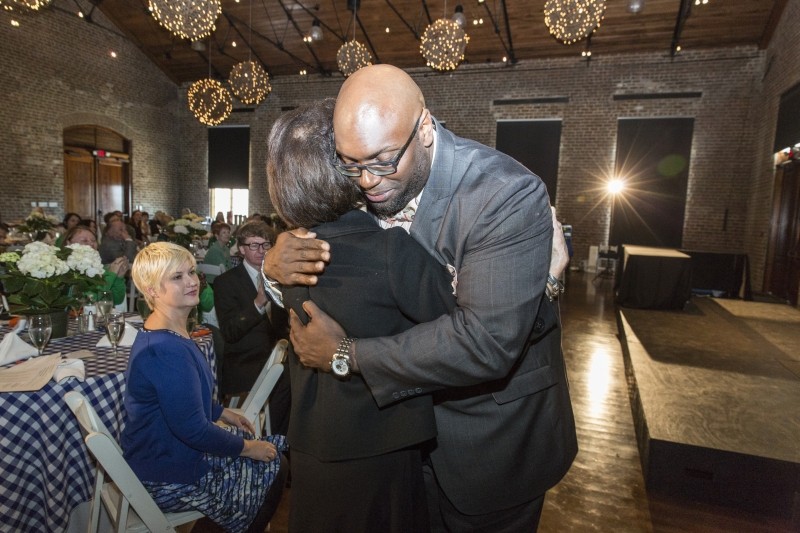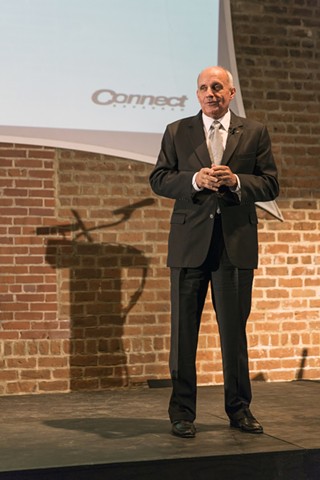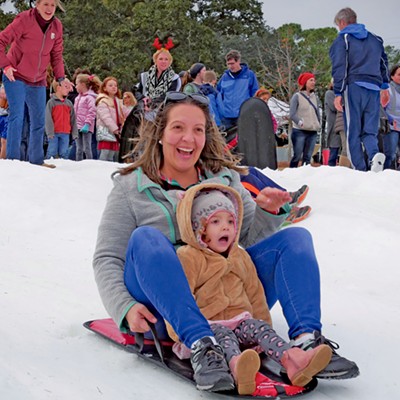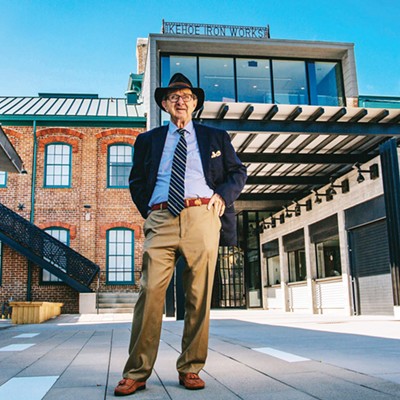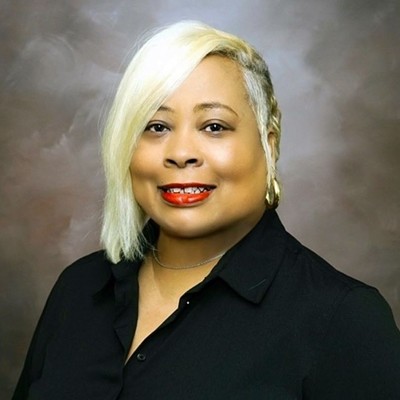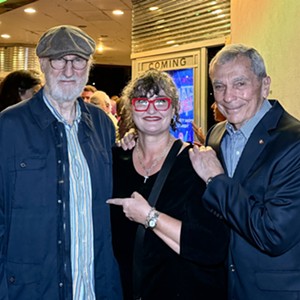EVERY COMMUNITY NEEDS a safety net for the least fortunate people in it.
Chatham County's no exception, and the Curtis V. Cooper Primary Care Center is the area's main "safety net" health care facility. It treats about 17,000 patients from the least-advantaged, most medically underserved sectors of society.
"Of those 17,000, 5,000 are diabetics, and 3,000 are individuals with cholesterol issues," explained Albert Grandy, Cooper Center CEO.
Grandy shared these grim statistics to a capacity crowd at the Charles H. Morris Center, gathered last week to mark the launch of Canyon Ranch Institute's Life Enhancement Program.
"Want to know how many of those 17,000 are also obese? Twelve thousand," Grandy said, to audible gasps.
Canyon Ranch Institute is a non-profit that was started by the founders of the Canyon Ranch health resort. Programs incorporate an eclectic range of disciplines, from nutrition to strength training to stress management.
The goal isn't only physical wellness for individuals, but the physical (and fiscal) health of the nation.
"Seventy-five cents of every health care dollar are spent on diseases which are totally preventable," says Dr. Richard H. Carmona, president of the Canyon Ranch Institute and 17th Surgeon General of the U.S.
But Canyon Ranch Institute also offers a customizable version of its wellness care program to at-risk communities, beginning with its pilot program in the South Bronx in 2008.
Savannah is the newest addition, and the Cooper Center will be the main local vector for Canyon Ranch Institute's expertise. The outreach—provided at no cost to local participants—wouldn't be possible without generous financial support from a major force in local publishing (and owner of Connect Savannah), Charles H. Morris, who began annual visits to Canyon Ranch 25 years ago with his wife Rosalie.
"At age 75, I'm fortunate that I've never had to take any medicines or blood pills or diabetes pills or anything like that. For me being able to share this journey to wellness is a dream come true," Morris said.
"I've learned about things to eat, what not to eat. I'm learning how to read my blood lipids, about getting my heart rate up three times a week, doing resistance training," he said.
"Rosalie and I have experienced the life-changing impact of healthy lifestyles, and we want our community to have the same opportunities."
Speaking of his friend Canyon Ranch Institute founder Mel Zuckerman, Morris said, "Mel has created a logical, simple and successful model to teach people how to take better care of themselves."
Pointing out that the Savannah launch is the Institute's "first foray into the stroke belt of the Southern United States," Canyon Ranch Institute's Andrew Pleasant echoed the urgency of Albert Grandy's appeal.
"Across the board, there's not one area where Savannah and Chatham County outperform the rest of the nation," said Pleasant, who serves as Canyon Ranch Institute's Senior Director of Health Literacy and Research. "The need for something like the Life Enhancement Program is real, it's tangible, and it's immediate."
Dr. Carmona may be best-known as the Surgeon General who directed the first comprehensive report on the true dangers of secondhand smoke.
But long before that role, he grew up dirt poor in the Bronx — not coincidentally the site of Canyon Ranch Institute's pilot program in an at-risk community.
"The issues you're dealing with here in Savannah are near and dear to my heart," Carmona told the crowd of health care professionals, elected officials, and business and community leaders. "I came from a very poor family, grew up in the inner city."
In explaining Canyon Ranch Institute's local versions of its Life Enhancement Programs—LEPs, in their lingo—Carmona was similarly blunt.
"The things all these places have in common are very tough populations. What we call social determinants of health. People who are poor, people who have no education, people who are unemployed, a high propensity for single moms," he said. "That's where we see the most disease."
The participants in the local program "are all going to be at risk for chronic disease like diabetes, heart attack," explained Pleasant. "They will come from low-income, traditionally underserved communities. We pay particular attention to the race and ethnic makeup of participants, the level of education and literacy, and how exposed they are to the negative effects of the social determinants of health."
Featuring an extraordinary amount of one-on-one attention and counseling—equivalent to four times the average American's face-time with health care professionals, Pleasant says—Savannah's LEP will take about 100 participants through three months of total wellness training, with follow-ups three months after that and at the one-year mark.
The main effort involves three hours once a week working with members of the LEP's "core team," hand-picked local professionals from the spectrum of cutting-edge wellness philosophy, from nutrition to proper exercise to stress management to behavioral change to social support.
"They're also going to go to exercise sessions, be with walking groups, or work with a gardening club on their off days," says Pleasant, reinforcing the LEP's multidisciplinary approach.
Before beginning, participants undergo an hour-long interview and a fitness assessment "just to see their physical condition before they do the program," says Pleasant. "Also we do bloodwork, which is actually, sadly, fairly rare."
Common factors are socioeconomic risk, and participants must be patients of Curtis V. Cooper, either current or admitted for the LEP.
But just wanting to help people isn't enough. What makes Canyon Ranch Institute's model successful where many others have failed to live up to expectations?
"It all comes down to culture. How do you take the best science in the world and translate it in a culturally competent manner to an end user to affect sustainable behavorial change?" Carmona tells Connect Savannah, also a major partner in the effort.
"You can have the smartest people trying to make change in that community, but it's not going to work unless the community embraces it and they confer upon you credibility."
For a year, Canyon Ranch Institute professionals spent time here determining the most culturally effective approach to sustaining the LEP's benefits.
"We look into the community and ask who are the opinion leaders, who are the thought leaders, where do people normally congregate? And that's usually the churches. In a predominantly Hispanic community it might be Catholic churches, where as in Savannah it's probably Baptist churches," Carmona tells us.
"That's not to say it's all about churches, but that's where you tend to find the predominant opinion leaders with great credibility in the communities we're seeking to help. In good times and bad times, that's where the community congregates."
One of Savannah's most influential pastors at one of its most historic congregations gave a powerful testimonial at the launch. The Rev. C. MeGill Brown is pastor of Second African Baptist Church, where General Sherman's Field Order Number 15—commonly known as "40 Acres and a Mule"—was first announced to emancipated former slaves in 1865.
"Two years ago I went to the doctor. I'm 6'5" and I weighed in at 425 pounds," said Brown, describing his own journey to wellness.
"I was pre-everything. Pre-diabetic, pre-hypertension, you name any sickness and I was headed in that direction," Brown said. "My father died before he was 60. My grandfather died before he was 55. At 42 I was headed in that direction."
Rev. Brown, who's also board chairman of the Cooper Center, says at that point he was looking for some "serendipity" to help him to health.
"That's when I met the folks from Canyon Ranch. That's when I realized it wasn't about losing weight, but changing a lifestyle. It was about changing a mindset."
Pleasant reinforced Brown's sentiment that the LEP is "not just a passing fancy, it's about fostering a true, deeply-felt change in someone's life. That's how change spreads to the family and that's how it spreads to the community at large."
Those "community-level magnifiers" extend to the practices of clinical partners, such as the Cooper Center.
"We've seen them change how they do business over time through the addition of integrative health. Our programs have always spun off into the greater community," says Pleasant.
"We've seen churches literally change how they're doing potlucks, to where it's now unheard of for people to bring in a really unhealthy dish," adds Jennifer Cabe, Canyon Ranch Institute executive director.
There's plenty of hard data to back up these anecdotes. Canyon Ranch Institute's benchmarks of success range from the complex to the very simple. For example, one indicator is a decrease in full-sugar soda consumption.
"There was one man in Missouri who was drinking 15 sodas a day when he came into the program. Three and a half years later, he hasn't had one yet," Pleasant said.
Across the board, LEP participants report about a 32 percent improvement in physical benchmarks like cholesterol and blood pressure. Nearly half continue increased exercising. And a whopping 68 percent report just plain say they live a healthier life overall, including longer, better sleep and number of "happy days."
With each LEP it helps run with each partner in each medically underserved community, Canyon Ranch Institute learns something new.
One extra focus in Savannah will be encouraging participants to take part in how-to healthy cooking demos and public gardening at Trustees Garden, across the street from the Cooper Center.
"We're bringing what we've learned from other partner sites, and we're starting off having a kitchen and a garden in a very short period of time," says Cabe. "It's a great addition."

